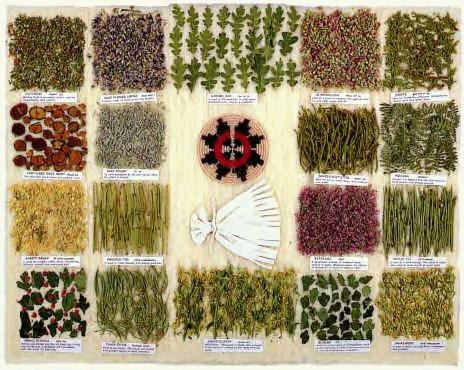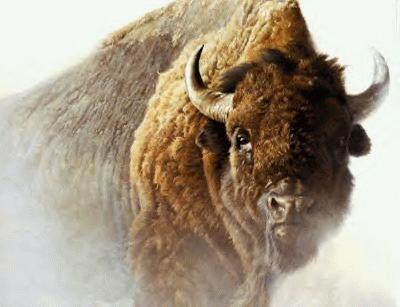|
Alma Snell says a slice of roasted buffalo lung
beats a potato chip any day. And its better for you, too, she contends.
Snell, an elder in the Crow Tribe, shared some
of her knowledge about traditional foods and medicines during the recent "Enhancing Tribal Health and Wellness
in the New Millennium" conference in Billings, which was sponsored by tribal leaders from Montana and Wyoming.
Snell and
other speakers from around the region told participants that "nature's provisions" have sustained native
peoples since time immemorial, and there's no reason to stop using them now.
But convincing modern-medicine practitioners that
the old ways are still valid is a constant struggle, said Tony Prairie Bear, a Northern Cheyenne tribal member
who helped organize the conference.
"We need to emphasis to our health-care providers
that we're Indian," Prairie Bear said.
"Western medicine only treats the physical
body, the ailments," while the practice of traditional Indian medicine also focuses on the mind and soul.
"My dream is to see us work hand-in-hand with
doctors," added Blackfeet herbalist Wilbert Fish. "There's a lot of things out there that can be cured
traditionally. We need to work together."
"If you go along with nature and eat the things
she provides, your body will have all it needs," said Snell, who went through a long list of plants that can
give sustenance, as well as cure ills and ailments.
Milkweed, for example, is used to treat arthritis
and warts. Elderberry tea is good for fighting the flu, coneflowers can clear up respiratory problems, and chokecherries
will stop diarrhea, she said. Traditional healers still use primrose to battle blood problems, as well as improve
complexions and reduces rashes.
Bitterbush, she said, takes the itch out of a poison
ivy infection, and Indian lettuce is used to make your body feel good all over.
Arrowleaf balsam root is also used by some traditionalists
to treat cancer.
For the more adventurous, prairie onion mixed with
a bit of tree sap works as an aphrodisiac, Snell explained.
"Don't you get too wide-eyed about that,"
she warned.
 Other natural commodities include bitterroot, which Snell said helps improve
memory, and lichens, which can be sucked on to soothe a sore throat. Other natural commodities include bitterroot, which Snell said helps improve
memory, and lichens, which can be sucked on to soothe a sore throat.
Horsemint tea is good for calming nerves, and pennyroyal
gives you energy.
Snell said one of her favorite plants is the cattail,
which can be eaten a variety of ways.
"When I go into one of those (patches), I
think I'm in a mini-mall," she said. "It's a total food product."
Snell and others noted that different tribes across
the country use the same plants in many different ways, depending on their local customs. She said she's constantly
amazed about the new uses she learns from native peoples in other areas.
While Indian ancestors found a plethora of foods
and medicines in the wild, they also got a lot of exercise every day, Snell said. Today, she observed, many people
eat too much of the wrong thing, then lie around the house doing nothing.
Blackfeet elder Floyd Rider added that he thinks
modern medicine has its place, but Indian people shouldn't rely on any one method to keep themselves healthy. While
he helps fellow tribal members fight diseases and ailments with traditional medicines, he's also had open-heart
surgery and takes prescription medications to help control his diabetes and treat his heart problems.
He said, however, he's often overwhelmed by the
number of people who come to him seeking natural alternatives to Western medicine.
Fish said he, too, is often overrun with requests
for traditional medicines. During a recent flu outbreak on the Blackfeet Reservation, he said he worked night and
day to prepare about 200 gallons of natural treatments for ailing tribal members.
While doctors and other health-care providers often
refer patients to him, they usually don't do it until they've exhausted their own healing methods without the desired
result.
"The sad thing is that people don't come to
medicine men until they're almost dead," Fish said, adding that traditional healers cure a lot of people,
but rarely get credit for their work.
"We have to teach," said Rider. "Its
not like the olden days anymore. The younger generation has lost its way of life, its culture."
"There"s no reason for you to run up
to that hospital every time you have a little pain or cough," Fish said. "There's some real simple stuff
out there" that can be gathered in the woods and on the prairie.
In fact, he said, American Indians should band
together and start their own pharmaceutical firms, especially considering that many modern medicines are derived
from plants and herbs.
The increased demand for echinachea, which grows
wild in many areas of eastern Montana, proves the point, he said. Pickers get paid about $1.47 a pound to harvest
the plants, and drug companies reap huge profits after they process and market it. American Indians, with their
vast knowledge of natural medicines, could be profiting, too, he said.
Fish also noted that there's many myths floating
around about native peoples and their various customs. For example, people generally view Plains Indians as being
primarily meat-eaters, but the Blackfeet were actually vegetarian for centuries.
In the beginning, he said, traditional stories
show that the buffalo ate humans before Napi, the Blackfeet creator, taught the two-leggeds how to hunt.
Reprinted under the Fair Use http://www4.law.cornell.edu/uscode/17/107.html
doctrine of international copyright law.
|


![]()